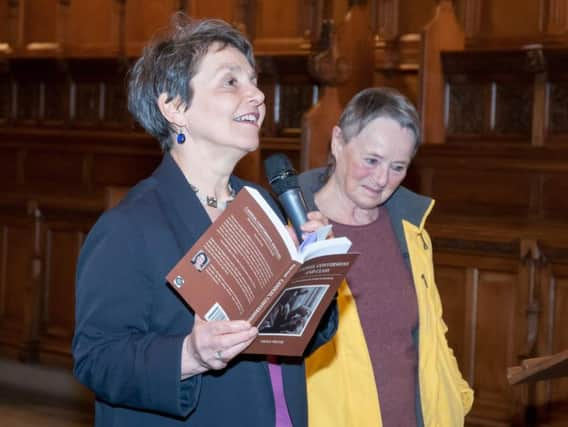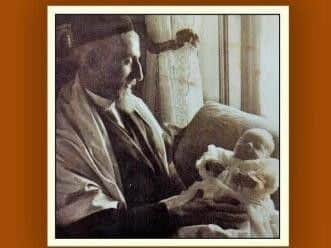How former Prestonian Fiona Frank traced five generations of a Jewish family and wrote a book about her research


Tracing five generations of one family has been a consuming interest and occupation for Fiona Frank for many years.
The quest has brought her friends and extended her family connections in ways she could not have imagined when she first began a serious academic study of how immigrant families fare over subsequent generations.
Advertisement
Hide AdAdvertisement
Hide AdFiona, who grew up in Preston and now lives at Halton, near Lancaster, believes her new book entitled ‘Candles, Conversions and Class: Five Generations of A Scottish Jewish Family’ based on her PhD studies, will have significance for many other families and communities.


She says: “I think my research has a resonance for other immigrant groups. It’s what happens to someone who comes to this country and what happens 100 years later to their culture - and I think that’s a resonance for new immigrants today and what might happen to their culture.”
For her PhD, entitled An Outsider Wherever I Am?, which was awarded by the University of Strathclyde in 2012, she had researched the history of the family her aunt, celebrated Glasgow artist Hannah Frank, her father’s sister, married into in 1939.
Fiona’s father Dr Leo Frank was a Preston GP with a surgery off Garstang Road. It was after his death that Fiona returned to her Jewish roots.
Advertisement
Hide AdAdvertisement
Hide AdShe said: “It was about 1989. When my father died I found that Judaism was so useful for burial and mourning that I came back to Judaism.”
The book tells of the lives of Rabbi Zvi David Hoppenstein and his wife Sophia, who arrived in Edinburgh in the 1880s and their descendants. They had nine children and those children had children and the family flourished or faltered as all families do.
She says: “The story of the Hoppenstein family recalls that of every immigrant family – with the pull of the new country clashing with the culture, traditions and language of the first immigrant generation. The book will interest anybody interested in oral history, Jewish history or today’s immigrant communities.”
Fiona, 64, tracked down and interviewed Zvi and Sophia’s descendants across the UK and as far as Cape Town.
Advertisement
Hide AdAdvertisement
Hide AdThe former pupil of Woodlands School in Preston and Queen Mary School in Lytham, studied languages at the University of Bath. Later, at Lancaster University, she researched workplace literacy using Baxi in Preston as a case study.
Fiona pays tribute to an ongoing link with Lancaster which has helped her studies - her membership of Lancaster University’s Continuing Learning Group which evolved from a Senior Learners’ Programme she herself founded in 2006.
She says: “I got loads of help from the Continuing Learning Group’s historian Rita Gerrard, who lives in Morecambe. She advised me on how to access information about census data and other historical records, and set up appointments for me at relevant archives offices.
“The Group’s Research Circle provides mutual support and encouragement to people engaged on independent research, and through the years I was doing my PhD I remained involved with the group, talking about the research process and sharing my struggles.”
Advertisement
Hide AdAdvertisement
Hide AdLike any family’s story there were surprises a-plenty as she recalls: “One third generation son, Leslie, married a non-Jewish doctor, changed his name, moved down to England, and never told his parents that he’d got married or that they had three grandchildren. They only found out many years later when his wife contacted their family doctor asking him to let the family know that he was very ill. Leslie’s father came down to Leicester to see him. In the taxi outside the station, Leslie’s wife told his father: ‘I’m Leslie’s doctor, but I’m also his wife and you have three grandchildren!’”
Happily the family, surprised to learn of their Jewish connections, have now met and retained contact with their Glasgow relatives.
Fiona’s book also details the experiences of those who took different paths: “Three of the men in the third generation married out and one of those children of those marriages married a Jewish man and converted back in again.”
She records how education provided a stepping stone for the male line in the family. “The Rabbi and his wife were very cultured and knowledgeable and interested in education - but very poor. Because of Carnegie grants, all men in the first generation in Edinburgh went to university... they were going to be able to get good jobs. Each married daughters of rich merchants whose family bought them houses.
Advertisement
Hide AdAdvertisement
Hide Ad“Their children were brought up in comfortable middle class lives. Meanwhile the women of the family didn’t get education at university. They did not have big earning potential and no dowries.”
The women’s circumstances dictated they married within the Glasgow working class: “It happened again in the next generation.”
Fiona’s questions also revealed prejudice in different forms. Concerns were sometimes were you a Billy or a Dan, a Protestant or Catholic? But she notes: “In my book I talked to people through the generations about anti-semitism. I found during five generations of the book there were five different types of anti-semitism came through the generations.”
These ranged from being subject to anti-Israel feelings, to children being beaten up in the 1950s and having their heads pushed down lavatories for being Jewish, to the difficulties in the 1930s of Jews obtaining a job or house in Glasgow.
Advertisement
Hide AdAdvertisement
Hide AdKenneth Collins, Chair of the Scottish Jewish Archives Centre, which has published her book, said: “I feel this book, and Fiona’s PhD, is of considerable importance – not just as a record of one particular family, but for the universal story it tells.”
* Fiona is now available to give talks about her research and book.
* Candles, Conversions and Class by Fiona Frank is published by the Scottish Jewish Archives Centre for £12.50 plus p. and p. See www.trybooking.co.uk/4826 or www.sjac.org.uk